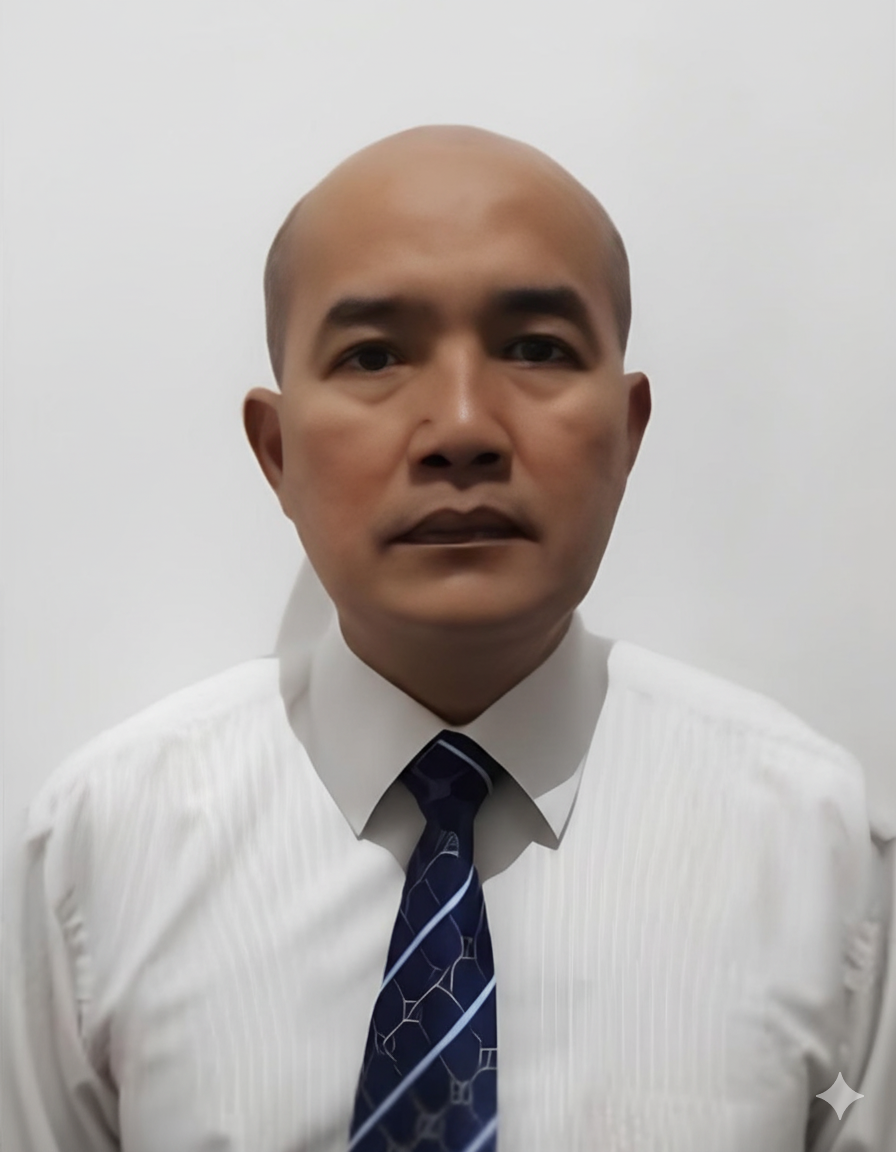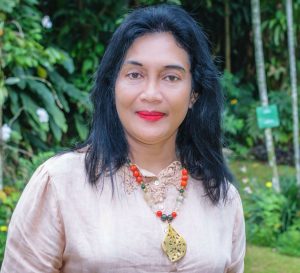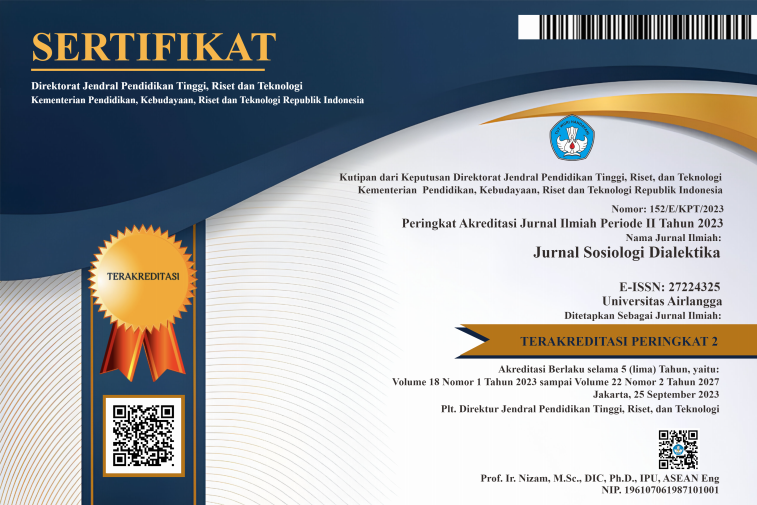A thematic analysis on the social conditions reflected in Bangsamoro literary pieces
Downloads
Sociology through literature of Lewis Coser inspired this study to thematically identify social conditions of Bangsamoro people using the literary works published online. Four volumes were gathered form Bangsamoro Literary Review from 2021 to 2023. The method is qualitative and thematic analysis was used to interpret and dissect the gathered literatures. Graphics or non-text form published in the journal was not included. Two levels were employed in thematic analysis: macro level (Lewis Coser) and micro level (Carter & Carter). It was revealed in the study that among twenty themes at macro level, thirteen themes emerged namely: culture, social control, socialization, self and other, status and role, sex and roles, total institutions, urban sociology, poverty, family religion, collective behavior, and, deviance. At micro level, optimism/pessimism, ambition, betrayal/revenge, curiosity/apathy, and, doubt/certainly depicted in the literary works studied. The lived experiences of Bangsamoro as one region shared common dilemmas encountered by most Filipinos such as poverty, family trust, dreaming big, safety, love affairs, and city-life. On the other hand, specific conditions from the narratives of writers as Bangsamoro are the marriage agreement, identity role, discrimination, strict religious beliefs, and others. Furthermore, literature unveils social conditions which can serve as sociological data to explore social structures and dynamics. This leads to a more comprehensible image of the extant culture, behavior, and local knowledge on particular groups.
Abrahamson M (2014) Urban Sociology: A Global Introduction. Cambridge: Cambridge University Press.
Abuza Z & Lischin L (2020) The Challenges Facing the Philippines’ Bangsamoro Autonomous Region at One Year. Washington: United States Institute of Peace.
Alwaqaa M (2020) Sociology and literature: An interdisciplinary approach. Journal of Liberal Arts and Humanities 1 (10):34-38.
Amnesty International (2021) Hate crimes against LGBTQI+ in BARMM must not go unpunished. Amnesty International, 23 September. [Accessed 4 March 2024]. https://www.amnesty.org.ph/2021/09/hate-crimes-against-lgbtqi-in-barmm-must-not-go-unpunished/.
Barra N (2014) The impact of Muslim religious groups on the changing roles of Muslim women in the Philippines: A study of tabligh jama’ah, Markazosshabab, and Ahl al-Bayt. IOSR Journal of Humanities and Social Science 19 (9):1-10. https://doi.org/10.9790/0837-19950110.
Berger RJ & Quinney R (2004) Storytelling Sociology: Narrative as Social Inquiry. Boulder: Lynne Rienner Publishers.
Carter M & Carter S (2014) How themes in literature can inform sociological theory, research, and teaching. The American Sociologist 45: 388-411. https://doi.org/10.1007/s12108-014-9221-1.
Castro N (2011) The socio-cultural situation in the Philippines. In: International Conference on Social Environment in Contemporary East Asia in the Age of Globalization. International and Interdisciplinary Studies on Ageing, Agriculture and Multicultural Situations, Japan.
Catmur C, Cross E, & Over H (2016) Understanding self and others: from origins to disorders. Philosophical Transactions of the Royal Society B. http://doi.org/10.1098/rstb.2015.0066.
Clarke P (2011) The Oxford Handbook of the Sociology of Religion. Oxford: Oxford Academic. https:/doi.org/10.1093/oxfordhb/9780199588961.001.0001.
Clark DS (2007) Encyclopedia of Law and Society: American and Global Perspectives. London: Sage publications. http://dx.doi.org/10.4135/9781412952637.
Coser LA (1972) Sociology through Literature (2nd ed). Englewood Cliffs: Prentice Hall.
Deflem M (2017) Social control. In: Turner S. The Wiley Blackwell Encyclopedia of Social Theory. Hoboken: John Wiley & Sons Ltd. https://doi.org/10.1002/9781118430873.est0351.
Dubey A (2020) Literature and society. IOSR Journal of Humanities and Social Science 9 (6):84-85. https://doi.org/10.9790/0837-0968485.
Gweshengwe B & Hassan N (2020) Defining the characteristics of poverty and their implications for poverty analysis. Cogent Social Sciences 6 (1):1768669. http://dx.doi.org/10.1080/23311886.2020.1768669.
Ionuţ A (2012) The social functions of the family. Euromentor Journal-Studies about education (02):133-139. https://www.ceeol.com/search/article-detail?id=215684.
Jopson TL (2016) Gender justice: “Gender” in the Bangsamoro development plan. In: Seedat M, Suffla S, & Christie D (ed). Enlarging the Scope of Peace Psychology. Peace Psychology Book Series. Cham: Springer. https://doi.org/10.1007/978-3-319-45289-0_11.
Kapahi A & Tañada G (2018) The Bangsamoro identity struggle and the Bangsamoro basic law as the path to peace. Counter Terrorist Trends and Analyses 10 (7):1-7. https://www.jstor.org/stable/10.2307/26458484.
Kumar S (2022) Literature and history: The relationship between the two. IOSR Journal of Humanities and Social Science 27 (6):19-23. https://doi.org/10.9790/0837-2706071923.
Labra O, Castro C, & Chamblás I (2019) Thematic analysis in social work: A case study. In: Nikku BR (ed). Global Social Work-Cutting Edge Issues and Critical Reflections. http://dx.doi.org/10.5772/intechopen.89464.
Lacar L Q (1995) Familism among Muslims and Christians in the Philippines. Philippine Studies 43(1):42-65. http://www.jstor.org/stable/42634059.
Lochmiller C (2021) Conducting thematic analysis with qualitative data. Qualitative Report 26 (6):2029-2044. https://doi.org/10.46743/2160-3715/2021.5008.
Macapagal MEJ, Montiel CJ, & Canuday JJP (2018) The unifying and divisive effects of social identities: Religious and ethnopolitical identities among Mindanao Muslims in the Philippines. Journal of Pacific Rim Psychology 12:e28. https://doi.org/10.1017/prp.2018.16.
Madale A (1998) Muslims: The misunderstood Filipinos. Philippine Studies 46 (4):492-503. http://www.jstor.org/stable/42634286.
Maines DR (1993) Narrative’s moment and sociology’s phenomena: Toward a narrative sociology. The Sociological Quarterly 34 (1):17-38. https://doi.org/10.1111/j.1533-8525.1993.tb00128.x.
Mangansakan G & Muslim K (2023) Bangsamoro Literary Review. https://bangsamororeview.com/main/about/.
May T, Perry B, Le Galès P, Sassen S, & Savage M (2005) The future of urban sociology. Sociology 39(2):343-370. https://doi.org/10.1177/0038038505050544.
Mitravinda K (2020) Literature and its role in shaping the society. Cape Comorin 2 (2). https://doi.org/10.31219/osf.io/rkdtb.
Monato S & Torrado R (2017) Bangsamoro Women’s Journey Towards Peace, Equality and Good Governance. Mandaluyong City: UN Women Philippines.
Montiel CJ, Rodil RB, & de Guzman JM (2011) The Moro struggle and the challenge to peace building in Mindanao, Southern Philippines. In: Landis D & Albert R (ed). Handbook of Ethnic Conflict. International and Cultural Psychology. Boston, MA: Springer. https://doi.org/10.1007/978-1-46140448-4_4.
Morillo H, Capuno JJ, & Mendoza AM (2013) Views and values on family among Filipinos: An Empirical Exploration. Asian Journal of Social Science 41 (1):5-28. https://doi.org/10.1163/15685314-12341278.
Mua M (2020) Cultural diversity among the Bangsamoro in Mindanao: A survey of their traditional arts. Budayaw – BIMP-EAGA Festival of Cultures. https://budayaw.com/cultural-diversity-among-the-bangsamoro-in-mindanao-a-survey-of-their-traditional-arts/.
Nalah A & Ishaya L (2013) A conceptual overview of deviance and its implication to mental health: A Bio psychosocial perspective. International Journal of Humanities and Social Science Invention 2 (12):1-9. https://doi.org/10.1037/rnd0000001.
Naldini M (2017) The sociology of families. In: Korgen K (ed). The Cambridge Handbook of Sociology: Core Areas in Sociology and the Development of the Discipline. Cambridge: Cambridge University Press. https://doi.org/doi:10.1017/9781316418376.029.
Paredes O (2022) Making Mindanao: Place-making and people-making in the southern Philippines. South East Asia Research 30 (1):3-8. https://doi.org/10.1080/0967828X.2022.2027215.
Patterson O (2014) Making sense of culture. The annual Review of Sociology 40: 1-30. https://doi.org/10.1146/annurev-soc-071913-043123.
Philippine Statistics Authority (2021) Official Poverty Statistics of the Philippines. Quezon City: Philippine Statistics Authority.
Pineda A (2024) Faith and family: Exploring religious and cultural rituals in Filipino traditions. Home Based Pinoy, 18 January. [Accessed 4 February 2024]. https://homebasedpinoy.com/faith-and-family-exploring-religious-and-cultural-rituals-in-filipino-traditions/.
Risman B & Davis G (2013) From sex to gender structure. Current Sociology Review 61 (5-6):733-755. https://doi.org/10.1177/0011392113479315.
Ritzer G (2007) Encyclopedia of Social Theory: Total Institutions. London: SAGE Knowledge. https://doi.org/10.4135/9781412952552.
Rothschild T (2014) Rothschild’s Introduction to Sociology. An adaptation of OpenStax’s Introduction to Sociology 2e. Bristol: Roger Williams University.
Šaras E & Perez-Felkner L (2020) Sociological Perspectives on Socialization. Oxford Bibliographies: Oxford University Press. https://doi.org/10.1093/OBO/9780199756384-0155.
Schirmer W & Michailakis D (2015) The help system and its reflection theory: A sociological observation of social work, Nordic Social Work Research 5 (1):71-84. https://doi.org/10.1080/2156857X.2015.1012106.
Serpa S (2018) On the concept of total institution. International Journal of Social Science Studies 6 (9):31-33. https://doi.org/10.11114/ijsss.v6i9.3467.
Shalini S & Samundeswari A (2017) Literature as a reflection of the society-a study. In: 1St National Conference on Teaching Innovations and Enhancing Learning (Arts, Science and Technology) 5 (1). 170-172.
Singer A (2011) A novel approach: The sociology of literature, children’s books, and social inequality. International Journal of Qualitative Research 10 (4):307-320. https://doi.org/10.1177/160940691101000401.
Tahir N (2021) Understanding arranged marriage: An unbiased analysis of a traditional marital institution. International Journal of Law, Policy and the Family 35 (1):ebab005. https://doi.org/10.1093/lawfam/ebab005.
Vignoles VL, Owe E, Becker M, Smith PB, Easterbrook MJ, Brown R, & Bond MH (2016) Beyond the ‘east–west’ dichotomy: Global variation in cultural models of selfhood. Journal of Experimental Psychology: General 145 (8):966-1000. http://dx.doi.org/10.1037/xge0000175.
Vizmanos JF & Albert JR (2018) Like a disease, poverty requires cure and prevention. Reppler, 27 August. [Accessed 5 January 2024]. https://www.rappler.com/voices/thought-leaders/210463,poverty-reduction-requires-prevention-and-cure/.
Zubenko S & Sytnykova Y (2020) Literature as a reflection of societies’ challenges. Postmodern Openings 11 (2):196-205. https://doi.org/10.18662/po/11.1sup2/152.

This work is licensed under a Creative Commons Attribution-NonCommercial-ShareAlike 4.0 International License.
1. Copyright of this journal is possession of Editorial Board and Journal Manager, by the knowledge of author, whilst the moral right of the publication belongs to the author.
2. Legal formal aspect of journal publication accessibility refers to Creative Commons Attribution-NonCommercial-ShareAlike (CC BY-NC-SA), implies that publication can be used for non-commercial purposes in its original form (cannot be modified).
3. Every publications (printed/electronic) are open access for educational purposes, research, and library. Other that the aims mentioned above, editorial board is not responsible for copyright violation.















